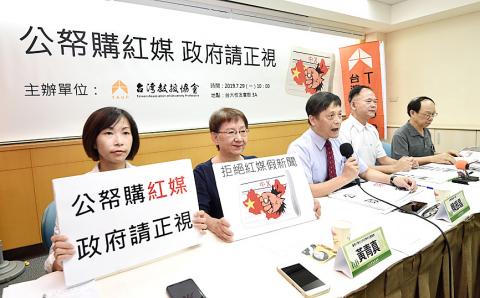The Taiwan Association of University Professors yesterday urged government agencies and state-owned enterprises to cancel their subscriptions to the Chinese-language China Times following allegations that the newspaper takes instructions from Beijing on how to prepare its news.
News presented from a China-centric perspective could pose a threat to Taiwanese society, yet the government has done little to address the issue, association president Lai Cheng-chang (賴振昌) told a news conference in Taipei.
“We do not want fake news from pro-China media outlets,” he said.

Photo: Peter Lo, Taipei Times
Following a report by London-based Financial Times earlier this month that the China Times takes orders on a daily basis from China’s Taiwan Affairs Office, the association looked into which government agencies and state-owned enterprises — from motor vehicle offices and post offices to the Bank of Taiwan and Chunghwa Telecom — subscribed to the newspaper, he said.
“A copy of the China Times was found in almost every one of them,” he said.
Food safety laws have been amended multiple times to protect people’s health and the government should take a similar approach to manage the media, National Taiwan University biochemical science and technology professor Huang Ching-jang (黃青真) said.
“Media outlets produce food for the mind and the government should have standards and management procedures for preventing that food from being poisoned,” she said.
National Taiwan Normal University Chinese associate professor Edwin Yang (楊聰榮) urged the government to adopt the idea of a “defensive democracy” and take action to address Beijing’s infiltration of Taiwanese media.
In Australia, Chinese infiltration is already being studied, he said, giving as an example the book Silent Invasion: How China is Turning Australia Into a Puppet State, which was published last year, adding that the Australian government has taken countermeasures.
That government agents and state-owned enterprises are widely subscribed to the China Times presents a serious issue, Taiwan Brain Trust member Chang Jen-chieh (張人傑) said.
It is unclear why they think that members of the public should read the newspaper, he added.
After the Financial Times’ report, Want Want China Times Media Group — which owns the China Times — said that it would file defamation lawsuits against the newspaper and other media companies that cited the report, said attorney Chen Yu-fan (陳雨凡), who is to compete for a legislative seat in the Xinyi-Southern Songshan district representing the New Power Party in next year’s elections.
The lawsuit could cause other media outlets to refrain from criticizing the group for fear of retaliation, she said.
Hopefully, the Legislative Yuan would pass a bill requiring individuals and organizations controlled by foreign governments or organizations to disclose such connections in the next legislative session, she added.

The inspection equipment and data transmission system for new robotic dogs that Taipei is planning to use for sidewalk patrols were developed by a Taiwanese company, the city’s New Construction Office said today, dismissing concerns that the China-made robots could pose a security risk. The city is bringing in smart robotic dogs to help with sidewalk inspections, Taipei Deputy Mayor Lee Ssu-chuan (李四川) said on Facebook. Equipped with a panoramic surveillance system, the robots would be able to automatically flag problems and easily navigate narrow sidewalks, making inspections faster and more accurate, Lee said. By collecting more accurate data, they would help Taipei

TAKING STOCK: The USMC is rebuilding a once-abandoned airfield in Palau to support large-scale ground operations as China’s missile range grows, Naval News reported The US Marine Corps (USMC) is considering new sites for stockpiling equipment in the West Pacific to harden military supply chains and enhance mobility across the Indo-Pacific region, US-based Naval News reported on Saturday. The proposed sites in Palau — one of Taiwan’s diplomatic allies — and Australia would enable a “rapid standup of stored equipment within a year” of the program’s approval, the report said, citing documents published by the USMC last month. In Palau, the service is rebuilding a formerly abandoned World War II-era airfield and establishing ancillary structures to support large-scale ground operations “as China’s missile range and magazine

STATS: Taiwan’s average life expectancy of 80.77 years was lower than that of Japan, Singapore and South Korea, but higher than in China, Malaysia and Indonesia Taiwan’s average life expectancy last year increased to 80.77 years, but was still not back to its pre-COVID-19 pandemic peak of 81.32 years in 2020, the Ministry of the Interior said yesterday. The average life expectancy last year increased the 0.54 years from 2023, the ministry said in a statement. For men and women, the average life expectancy last year was 77.42 years and 84.30 years respectively, up 0.48 years and 0.56 years from the previous year. Taiwan’s average life expectancy peaked at 81.32 years in 2020, as the nation was relatively unaffected by the pandemic that year. The metric

A 72-year-old man in Kaohsiung was sentenced to 40 days in jail after he was found having sex with a 67-year-old woman under a slide in a public park on Sunday afternoon. At 3pm on Sunday, a mother surnamed Liang (梁) was with her child at a neighborhood park when they found the man, surnamed Tsai (蔡), and woman, surnamed Huang (黃), underneath the slide. Liang took her child away from the scene, took photographs of the two and called the police, who arrived and arrested the couple. During questioning, Tsai told police that he had met Huang that day and offered to